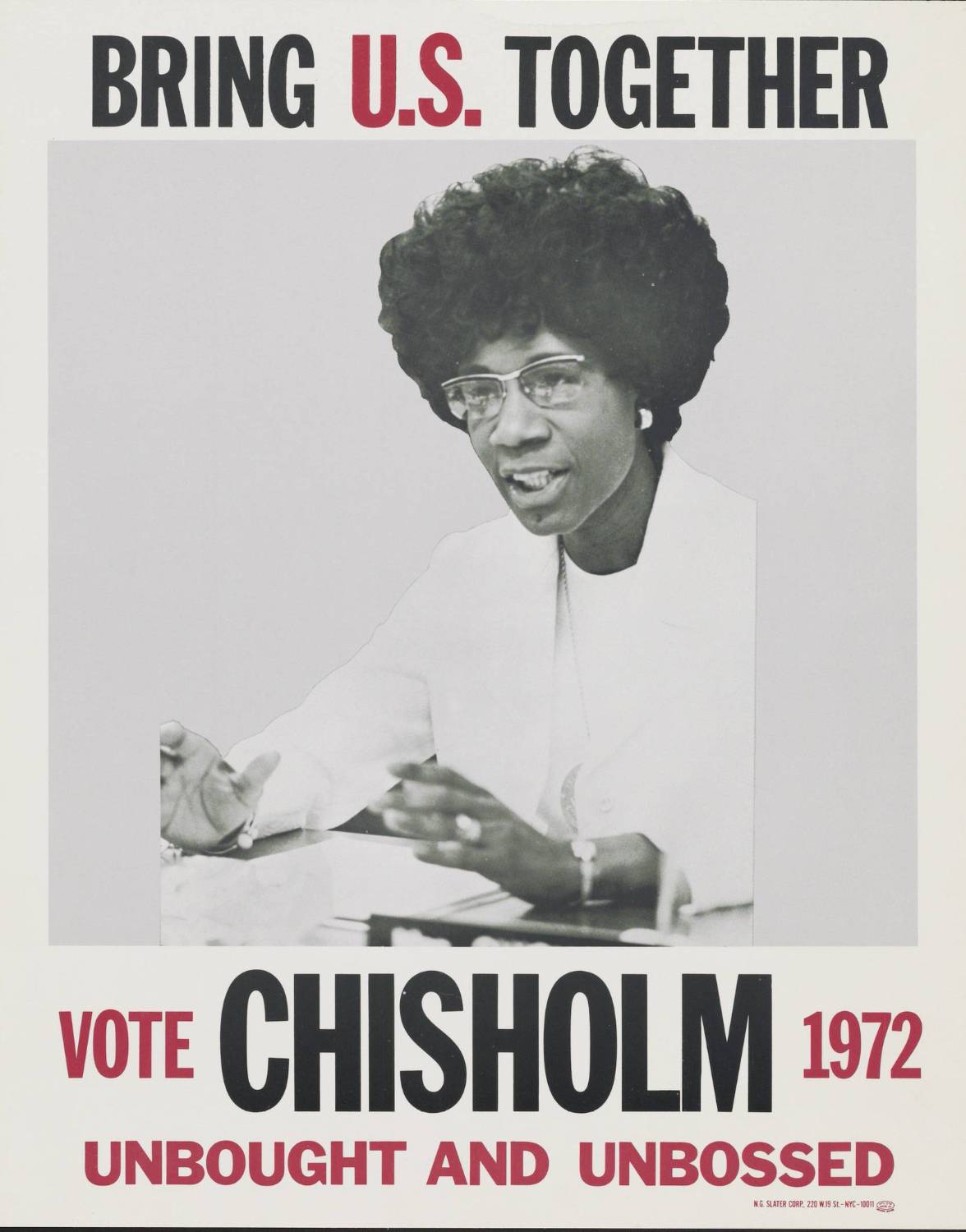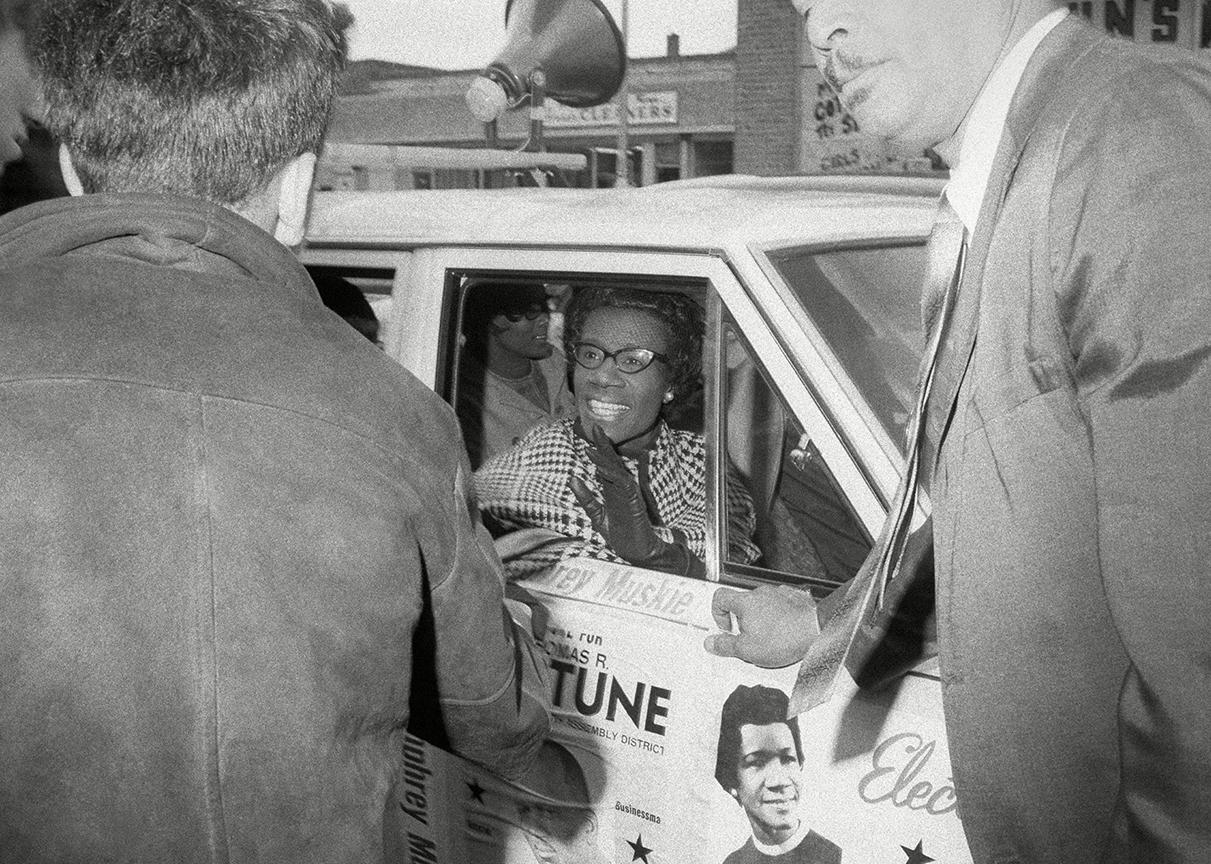Jim Crow Museum
1010 Campus Drive
Big Rapids, MI 49307
[email protected]
(231) 591-5873
 Q: Shirley Chisholm is featured in an animation video produced by Kendall College of Art and Design, Digital Art and Design students.
Here is the expanded script for the animation.
Q: Shirley Chisholm is featured in an animation video produced by Kendall College of Art and Design, Digital Art and Design students.
Here is the expanded script for the animation.
A: President Barack Obama posthumously awarded Chisholm the Presidential Medal of Freedom.
"When Shirley was assigned to the House Agriculture Committee despite the fact that her district was from New York City, she said, 'Apparently all they know in Washington about Brooklyn was a tree grew there.' "
Shirley Chisholm was born on November 30, 1924 to working class immigrant parents in Brooklyn, N.Y. Chisholm attended a highly regarded, integrated, all Girls’ High School in Bedford-Stuyvesant neighborhood. Shirley attended Brooklyn College on a scholarship and graduated cum laude with a B.A. in sociology in 1946. In 1952, she earned a Master of Arts-Elementary Education from Columbia University.
After college, Chisholm taught and became director of early education programs in New York City, and later a consultant to New York City's Division of Day Care. She was active in multiple political campaigns, civil rights, and education advocacy organizations. Chisholm frequently clashed with male leaders over her push to expand leadership roles to women within these orgs demonstrating her tenacity to fight for equality and giving a glimpse of her philosophy “If they don’t give you a seat at the table, bring a folding chair.”
In 1964, Chisholm was elected to the New York State Assembly where she served from 1965 to 1968. She advocated against the state’s English-only literacy test, insisting that just because someone "functions better in his native language is no sign a person is illiterate" (Harlem World Magazine 2019). Chisholm also successfully sponsored legislation extending unemployment benefits to domestic workers who were overwhelmingly women of color.
It was a court–ordered redistricting plan that carved a new congressional district out of Chisholm's Bedford–Stuyvesant neighborhood which convinced her to run for Congress in 1968. In the primary, Chisholm faced three prominent African American challengers. Chisholm traveled the new district in a sound truck while she announced: "Ladies and Gentlemen … this is fighting Shirley Chisholm coming through."
 In the general election, Chisholm faced Republican–James Farmer, a respected figure
of the civil rights movement and a former organizer of the early 1960s Freedom Riders.
The two candidates held many similar positions; however, gender became a central issue
in the election. Farmer argued that "women have been in the driver's seat" in black
communities for too long and that the district needed "a man's voice in Washington,"
not that of a "little schoolteacher." Chisholm was steadfast and appealed to the
growing Hispanic population and argued that men were “in office here before I came
in five years ago, but they didn't deliver" (Women in Congress, 2006). Chisholm won
the general election by a resounding 67 percent of the vote, becoming the first Black
woman elected to the U.S. Congress (Washington, Outstanding Women in Congress 1995).
In the general election, Chisholm faced Republican–James Farmer, a respected figure
of the civil rights movement and a former organizer of the early 1960s Freedom Riders.
The two candidates held many similar positions; however, gender became a central issue
in the election. Farmer argued that "women have been in the driver's seat" in black
communities for too long and that the district needed "a man's voice in Washington,"
not that of a "little schoolteacher." Chisholm was steadfast and appealed to the
growing Hispanic population and argued that men were “in office here before I came
in five years ago, but they didn't deliver" (Women in Congress, 2006). Chisholm won
the general election by a resounding 67 percent of the vote, becoming the first Black
woman elected to the U.S. Congress (Washington, Outstanding Women in Congress 1995).
Chisholm had a very successful congressional career prior to her Presidential run, working on Agriculture, Education, and Veteran’s committees. Chisholm also was a founding member of the Congressional Black Caucus (CBC) and the Congressional Women's Caucus.
In 1972, Chisholm sought the Democratic nomination for President becoming the first Black candidate from a major party to run for President and the first woman in the Democratic party to run. She contended that none of the other candidates represented the interests of blacks and the inner–city poor. However, Chisholm was blocked from participating in televised primary debates; after taking legal action, networks allowed her to make one speech. Chisholm successfully campaigned nationwide, and her name was placed on 12 primary ballots. At the Democratic National Convention, she received an impressive 152 delegate votes despite her meager financial support.
As Chisholm’s national profile grew, it also created some resentment among her House colleagues. Many Black colleagues felt the Chisholm was more concerned about the interests of women, Hispanics, welfare recipients, and white liberals, over the interests of the caucus. Chisholm noted that once again gender discrimination was front and center observing that "Black male politicians are no different from white male politicians. This ‘woman thing' is so deep. I've found it out in this campaign if I never knew it before" (Black Americans in Congress, 2007). Faced with challenges and dangers from within and from without, there were three confirmed assassination threats against her during the campaign. Undeterred by it all, Chisholm proudly ran on the campaign slogan of: Unbought and Unbossed.
Chisholm served seven terms as U.S. Representative, retiring from office in 1982.
She returned to teaching, at Mount Holyoke College in Massachusetts, and became a
popular lecturer on campuses across the nation. Chisholm, wrote about her future
legacy in 1968 saying “I hope if I am remembered it will finally be for what I have
done, not for what I happen to be. And I hope that my having made it, the hard way,
can be some kind of inspiration, particularly to women” (Coretta Scott King Awards,
2009).
Chisholm, who died Jan. 1, 2005, lived up to her hopes and is remembered for what
she had done and is still inspiring people all over the country.
Lisa Kemmis and the Jim Crow Museum staff
Jim Crow Museum 2020
Additional Resources
Harlem World Magazine, & Harlem World Magazine. (2019, March 25). Shirley Chisholm's Harlem Years 1946-1950's first black woman elected to the United States Congress,. Retrieved October 08, 2020, from https://www.harlemworldmagazine.com/shirley-chisholms-harlem-years-1946-1950s-first-black-woman-elected-to-the-united-states-congress/
Millender-McDonald, J., & Ehlers, V. J. (2006). Women in Congress, 1917-2006. Washington, D.C.: U.S. Goverment Printing Office.
Brady, R. A., & Ehlers, V. J. (2008). Black Americans in Congress, 1870-2007. Washington, D.C: U.S. G.P.O.
Smith, H. M. (2009). The Coretta Scott King awards, 1970-2009: 40th Anniversary. Chicago: American Library Association.